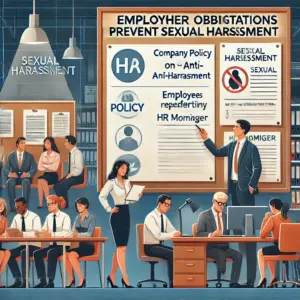You deserve a workplace free from harassment, including sexual harassment. Employers have a legal duty to create a safe environment. They must address issues promptly and prevent harassment before it starts. This responsibility is not just ethical; it’s required by law. By understanding these obligations, you can hold employers accountable. A Sexual harassment lawyer Connecticut can provide insights into your rights and the necessary legal steps. Employers must implement clear policies against harassment. Training programs are essential. They need to inform employees about what constitutes harassment and how to report it. Regular reviews of workplace culture and practices can help identify risks. Encouraging openness and communication can deter inappropriate behavior. Employers must act swiftly if harassment occurs. Investigations should be thorough and fair. The consequences for violators need to be clear. Knowing these obligations empowers you to advocate for yourself and others, ensuring a respectful work environment.
Understanding Legal Obligations
Employees often wonder what specific steps employers must take. According to the U.S. Equal Employment Opportunity Commission (EEOC), employers have several key responsibilities.
- Policy Implementation: Employers must have a clear, concise anti-harassment policy. This policy needs to outline unacceptable behaviors and reporting mechanisms.
- Training Programs: Regular training ensures that employees and management understand what constitutes harassment. It also informs them on how to handle incidents properly.
- Prompt Action: When harassment is reported, employers must act immediately. An investigation should be launched to address the issue.
Comparison of Employer Actions
| Action | Proactive Measure | Reactive Measure |
| Policy Development | Creating and disseminating clear policies | Updating policies after incidents occur |
| Training | Regularly scheduled sessions | Organizing training after incidents |
| Reporting Mechanism | Easy, confidential reporting channels | Temporary reporting solutions |
The Role of Training and Communication
Training programs are not just a formality. They are a critical tool in preventing harassment. Employers should regularly assess and update these programs. Employees need to feel comfortable reporting issues without fear of reprisal. Open communication is key. Employers must encourage employees to speak up and trust that their concerns will be addressed.
Swift and Fair Investigations
Once a complaint is made, employers have to investigate. This should be done with care to ensure fairness for all parties involved. Investigations must be conducted discreetly and efficiently. Employers can consult legal experts or utilize resources from the U.S. Department of Labor to guide their procedures. Any findings should lead to appropriate action, and employees should be informed about the outcome.
Consequences and Accountability
Consequences for violators should be clear and firm. Employers must ensure that offenders face repercussions. This not only addresses the current issue but also deters future incidents. The workplace should have a zero-tolerance policy for harassment. Enforcing consequences consistently is crucial.
Employer Checklist for Preventing Harassment
- Develop and distribute a clear anti-harassment policy.
- Conduct regular training sessions for all employees.
- Establish a confidential reporting system.
- Investigate complaints promptly and thoroughly.
- Enforce consequences for confirmed cases of harassment.
- Regularly review and assess workplace culture.
By following these steps, employers not only comply with legal requirements but also foster a supportive and respectful work environment. Everyone deserves to feel safe at work. Understanding employer obligations can empower you to ensure a harassment-free workplace.


